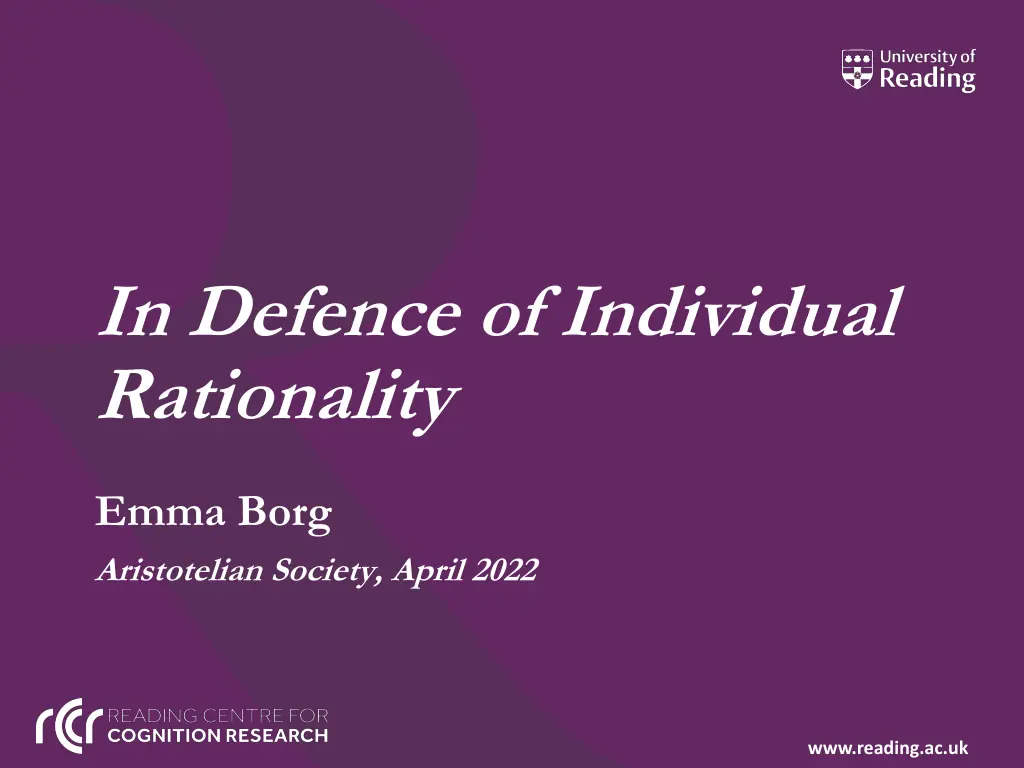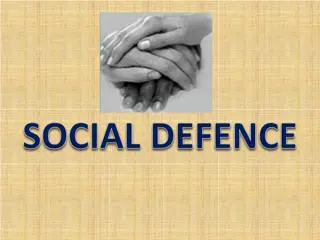
Individual Rationality and Common-sense Psychology Debates
Explore the defense of individual rationality against criticisms, highlighting the interplay between commonsense psychology and classical rational choice theory. Dive into the pre-theoretical sense of reasons, ideal rational choice theory, and recent challenges to CP assumptions. Discover the implications of empirical evidence on human decision-making and agency.
Download Presentation

Please find below an Image/Link to download the presentation.
The content on the website is provided AS IS for your information and personal use only. It may not be sold, licensed, or shared on other websites without obtaining consent from the author. If you encounter any issues during the download, it is possible that the publisher has removed the file from their server.
You are allowed to download the files provided on this website for personal or commercial use, subject to the condition that they are used lawfully. All files are the property of their respective owners.
The content on the website is provided AS IS for your information and personal use only. It may not be sold, licensed, or shared on other websites without obtaining consent from the author.
E N D
Presentation Transcript
In Defence of Individual Rationality Emma Borg Aristotelian Society, April 2022 www.reading.ac.uk
Plan: What is a reason and what is it to be rational? Commonsense Psychology (CP) & Classical Rational Choice Theory. Objection: experimental work shows lots of what we do is irrational. 1. Non-reasoning (automatic) decision-making system. 2. Use of our reasoning system(s) is fundamentally flawed. Argument 1: The Automatic System Evidence = Cognitive Reflection Test, heuristics & biases. Reject the evidence & reject dual process approaches. Argument 2: Improper Use Evidence = Wason Task, motivated reasoning, identity-protective cognition. Argue these are not problematic for CP. Conclusion: empirical evidence does not show that we are systematically irrational. CP s claim about individual rationality can stand.
Reasons and Rationality Pre-theoretical sense of reasons: Why did you go into the kitchen? I wanted a drink and believed I could get one in the kitchen. What made Maya run out of the room? She realised it was 5pm and was worried she would be late home. These are examples where actions are held to be the result of rational processing over mental states that capture a person s reasons. Common-sense Psychology (CP): we are creatures with contentful mental states (e.g. propositional attitudes like desires/beliefs) and intentional action is the result of rational processing involving these states. Typically, we do what we do based on the reasons we have.
What is it to act in light of reasons? Classical/Ideal rational choice theory holds that individual decision-making ought to: Aim at maximising expected utility for the agent. Consider all the evidence. Utilise classical logic in deterministic environments and probability theory in uncertain or vague situations. This Classical model underpins the view of humans as homo economicus in behavioural economics and homo politicus in political theory.
Lots of extant debates about CP. Recent debate about CP = rejection of its fundamental assumptions: experimental work shows that often/regularly/systematically our actions are not the result of rational processing of reasons. Doris 2015: 64-8 frames this challenge as follows: Where the causes of [an agent s] cognition or behaviour would not be recognised by the actor as reasons for that cognition or behaviour, were she aware of these causes at the time of performance, these causes are defeaters. Where defeaters obtain, the exercise of agency does not obtain. If the presence of defeaters cannot be confidently ruled out for a particular behaviour, it is not justified to attribute the actor an exercise of agency [Unfortunately] the empirical evidence indicates that defeaters occur quite frequently in everyday life. Example: where a snack is located in a display influences shopping behaviour.
Objection: We often fail to act in line with Classical Rational Choice Theory A wealth of experimental evidence shows that Classical Rational Choice theory fails to predict how humans actually behave (contra CP, often we don t act for reasons). Two distinct arguments for this conclusion: 1. Use of non-reasoning/Automatic decision-making systems: agents often don t try to reason at all (instead relying on an automatic, intuitive system; e.g. Kahneman). 2. Improper use of a reasoning system: agents often try but fail to reason properly (due to a systematic failure).
Argument 1: The Automatic System System 1: fast, automatic, intuitive judgements delivered by cognitive heuristics (rules of thumb, e.g. objects which appear blurry are far away ). System 1 involves (non-rational) processes which sacrifice accuracy for speed. System 2: slow, reflective, effortful judgements delivered by classical rationality. Default-Interventionist (DI) model (Evans 2006, Kahneman 2011): System 1 provides the default response to decision- making problems. System 2 intervenes only if the subject becomes aware that System 1 has gone wrong ( conflict awareness ).
Evidence for the Automatic System (1) The Cognitive Reflection Test (CRT, Frederick 2005) A bat and a ball cost $1.10 in total. The bat costs $1.00 more than the ball. How much does the ball cost? _____ cents Intuitive answer = 10c. Logical answer = 5c. On CRT questions there is a correct logical answer, but the majority of people give a mistaken intuitive answer instead.
Evidence for the Automatic System (2) Our decisions are often made using (non-reasoning) heuristics (Kahneman & Tversky 1975, Kahneman 2011) (2.i) Representativeness: the likelihood of x being F is assessed via x s similarity to other known F s. Linda is 31 years old, single, outspoken, and very bright As a student, she was deeply concerned with issues of discrimination and social justice, and also participated in anti- nuclear demonstrations. Which is more probable: (i) Linda is a bank teller or (ii) Linda is a bank teller and is active in the feminist movement The error stems from the use of the representativeness heuristic: Linda s description seems to match bank teller and active in the feminist movement far better than bank teller . As Stephen Jay Gould once observed, I know [the right answer], yet a little homunculus in my head continues to jump up and down, shouting at me But she can t just be a bank teller; read the description! Gould s homunculus is the Automatic System in action . -- Thaler and Sunstein 2008: 29
Evidence for the Automatic System 2.ii) Cognitive Availability: the likelihood of F occurring is assessed via the subject s familiarity with other instances of F (e.g. terrorist attacks). 2.iii) Anchoring & adjustment: the likelihood or value of x is assessed from a (potentially irrelevant) contextual anchor point, with adjustments made from that point (e.g. assessing city size). 2.iv) Confirmation bias: we look for/pay more attention to things which support what we already believe. 2.v) Framing: irrelevant features of the way information is presented affects choice (e.g. preference for a procedure described in terms of 80% chance of survival vs 20% chance of death ). 2.vi) Implicit Bias & Nudge: the choices people make can be improved by controlling for the unconscious, unreasoning causes which would otherwise bias their decisions (e.g. unconscious racial stereotypes).
Challenging the Evidence for the Automatic System 1. Well-known issues with replication & ecological validity (Koehler 2010, many labs project). 2. Some cases can be explained by better sensitivity to pragmatics; e.g: Bat and ball: The bat costs $1 more than the ball is heard as telling you what you have to pay after buying the ball, not as a claim about relational value of the objects. Linda: the fact that the speaker bothers to inform you that Linda fits the stereotype for a feminist is itself informative affects what the speaker conveys. Framing effects: show sensitivity to pragmatics of how information is presented (e.g. in terms of a contextual reference point ).
Challenging the dual system model Dual process models are premised on the idea that we can individuate automatic/unreasoned vs reasoned decisions using one, or a bundle of, other properties. But it s very unclear we can do this (Samuels 2009 crossover problem ; Keren 2013). Positive definitions yield a category that contains both: Heuristics = simple (or no) rules. But some heuristic rules are complex, some logical rules are simple (and generally held to be computational). ii. Heuristics = fast/unconscious/automatic. But logical processes can be fast/unconscious/automatic too (De Neys 2018). iii. Heuristics = error prone. But no more so than logical transitions. Negative definition (heuristics = non-logical transitions) yields a gerrymandered category (rather than focusing on mechanisms, e.g. association) which doesn t map to any of the other alleged properties. i.
Concessions on rational decision making The challenge from automatic decision-making processes does demonstrate the need for a more inclusive account of human rationality than Classical Rational Choice theory. Need to refine the account in three directions: i. Aim: rational agents aim at good enough solutions (satisfycing), rather than maximizing utility. (Simons 1955 bounded rationality.) ii. Rational processes look at some, not necessarily all, evidence. (Gigerenzer 2002 adaptive rationality.) iii. Processes: classical logic, probability theory and associative thinking (heuristics). (i-iii) plus a richer understanding of pragmatics can resolve the challenge from Automatic system to CP, but it opens up a new worry
Challenge 2: Improper Use of Logical Systems Agents arrive at decisions or judgements using reasoning mechanisms (e.g. involving logic or probability theory), but their use of these systems fails (in some systematic way) to reach the standards required for rational decision making. There is something fundamentally wrong with the way we deploy our reasoning resources which means we are irrational. Evidence comes from: (i) Wason Selection Task. (ii) Biased evidence gathering/assimilation ( motivated reasoning ). (iii) Belief polarization due to belief disconfirmation.
i. Wason Selection Task Which card(s) must be turned over to test the rule that if a card shows an even number on one face, then its opposite face is red? In Wason s original experiment, less than 10% of participants delivered the logically correct result ( 8 & brown ). Turning red card over is irrelevant: if the red card has an even number on the reverse, that fits with the rule, and if it has an odd number that doesn t matter, as the rule isn t if and only if even number then red . Repeated failure in this test is taken to show that people are systematically poor at (abstract) conditional reasoning.
ii) Motivated reasoning Subjects tend to: pay attention to things that support what they already believe/ignore counter-evidence (e.g. Ross 1975, Anderson 1983) be overconfident (attribute too high a credence to extant beliefs) engage in belief polarization (groups of like-minded individuals reinforce a shared belief via poor reasons). What [people] find difficult is not looking for counter-evidence or counterarguments in general, but only when what is being challenged is their own opinion [R]easoning systematically works to find reasons for our ideas and against ideas we oppose. It always takes our side This is pretty much the exact opposite of what you should expect of a mechanism that aims at improving one s beliefs through solitary ratiocination. There is no obvious way to explain the myside bias from within the intellectualist approach to reasoning. Mercier & Sperber 2017: 218.
Belief polarization due to belief disconfirmation (Mandelbaum 2018) Sometimes subjects increase their degree of credence in p in the face of accepted disconfirming evidence for p. This is the exact opposite of what is predicted by a Bayesian belief-updating procedure. Experimental evidence: religious beliefs (Batson 1975), cults (Dawson 1999), but also attitude to technology (Plous 1991), gun control (Taber & Lodge 1992), etc. The cognitive system is set up to properly output actions we categorize as irrational (Mandelbaum 2018: 4), in order to protect an individual s sense of self (Kahan 2016).
Challenging the evidence of improper use Standard answers in Wason Task are rational if subjects are reasoning using Bayesian (rather than Popperian) methods. More practical versions of the Wason Task deliver more logical results (Cosmides & Tooby). Contra Sperber & Mercier, biased evidence search/motivated reasoning is often perfectly rational: Since rational processes can look at some rather than all evidence and arrive at good enough (rather than optimal) decisions, a process which ignores some counter- evidence can still be rational (e.g. skipping Toyota ads). Some Bayesian models actually predict biased assimilation (Kelly 2008, Jern et al 2014). Of course there is a balance to be struck
Challenging the evidence of flawed use Too great a degree of belief preservation (i.e. scepticism about presented evidence) can slide over into irrational fact-blindness /unwarranted dismissal of counter-evidence, but in principle motivated reasoning can be rational. How we determine the boundary line between rational skepticism and irrational bias is a critical normative question, but one that empirical research may not be able to address. Research can explore the conditions under which persuasion occurs (as social psychologists have for decades), but it cannot establish the conditions under which it should occur. It is, of course, the latter question that needs answering if we are to resolve the controversy over the rationality of motivated reasoning. -- Taber & Lodge 1992: 768.
Belief polarization due to belief disconfirmation? Evidence is weak for this phenomenon with respect to more ordinary beliefs (like belief in reliability of technology, health related claims, gun control). Mandelbaum may be right that for certain kinds of beliefs (e.g. religious beliefs), Bayesian reasoning breaks down (in favour of self-protection), but that is not enough to show CP is wrong. CP is an account of typical action generation, not a universal claim (e.g. allows for akrasia, conflicting occurrent & dispositional beliefs, etc, may well not stretch to matters of faith).
Conclusion Commonsense Psychology claims that, typically, intentional actions are the result of rational processing of our reasons. This view on action generation is challenged by: 1. The use of non-reasoning/automatic decision making systems. 2. Improper use of reasoning systems. Contra (1): can reject much of the evidence for irrational decision- making (explaining it through sensitivity to pragmatics) & reject the dual process/system model on which the challenge is based. Contra (2): motivated reasoning can (in principle) be rational. Only belief polarization due to belief disconfirmation is truly problematic, but these are special cases where claims of rationality may indeed be tenuous. Experimental evidence does not show that CP s assumption of individual rationality must be rejected: in general, people do act in light of their reasons.






















